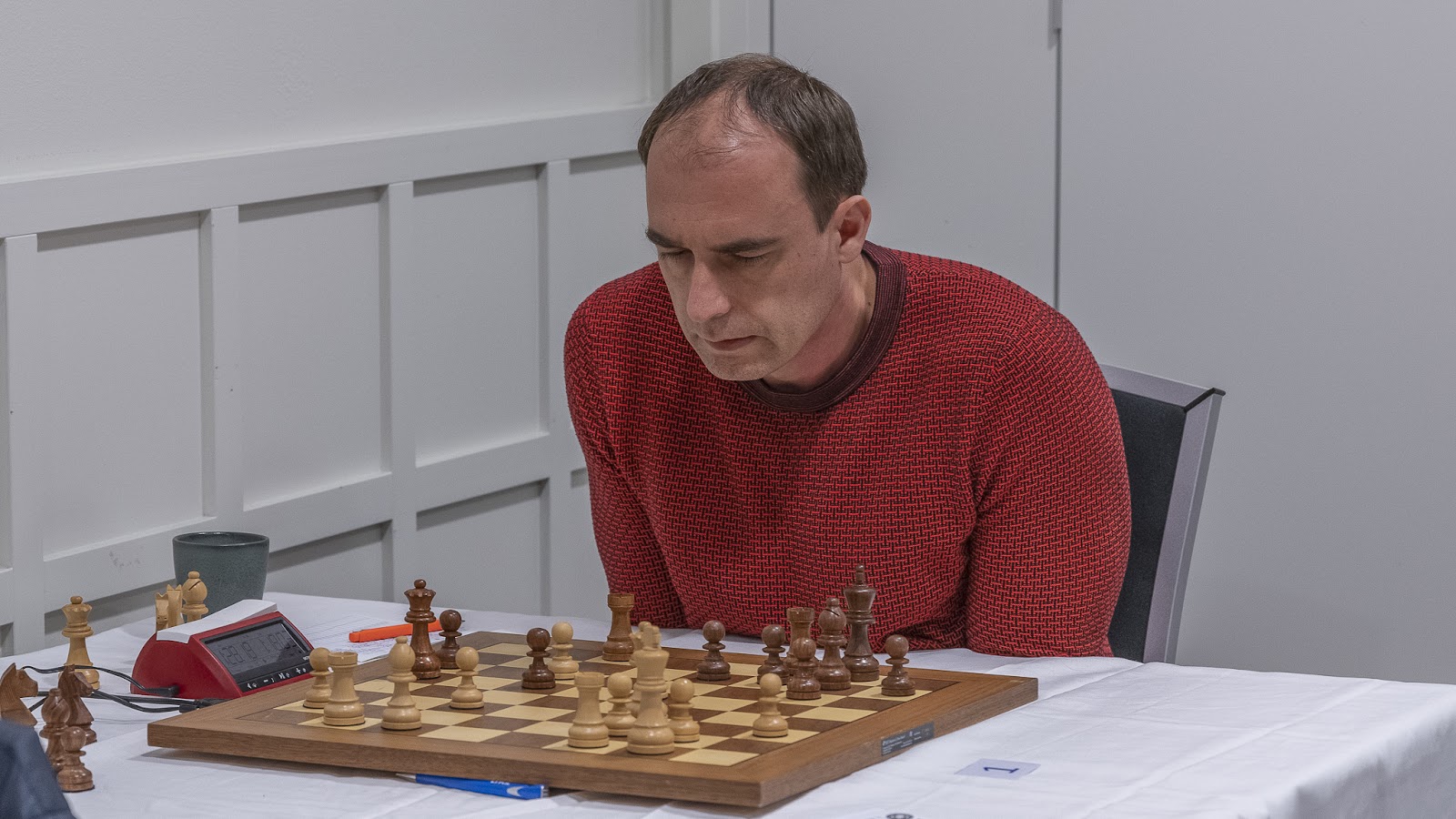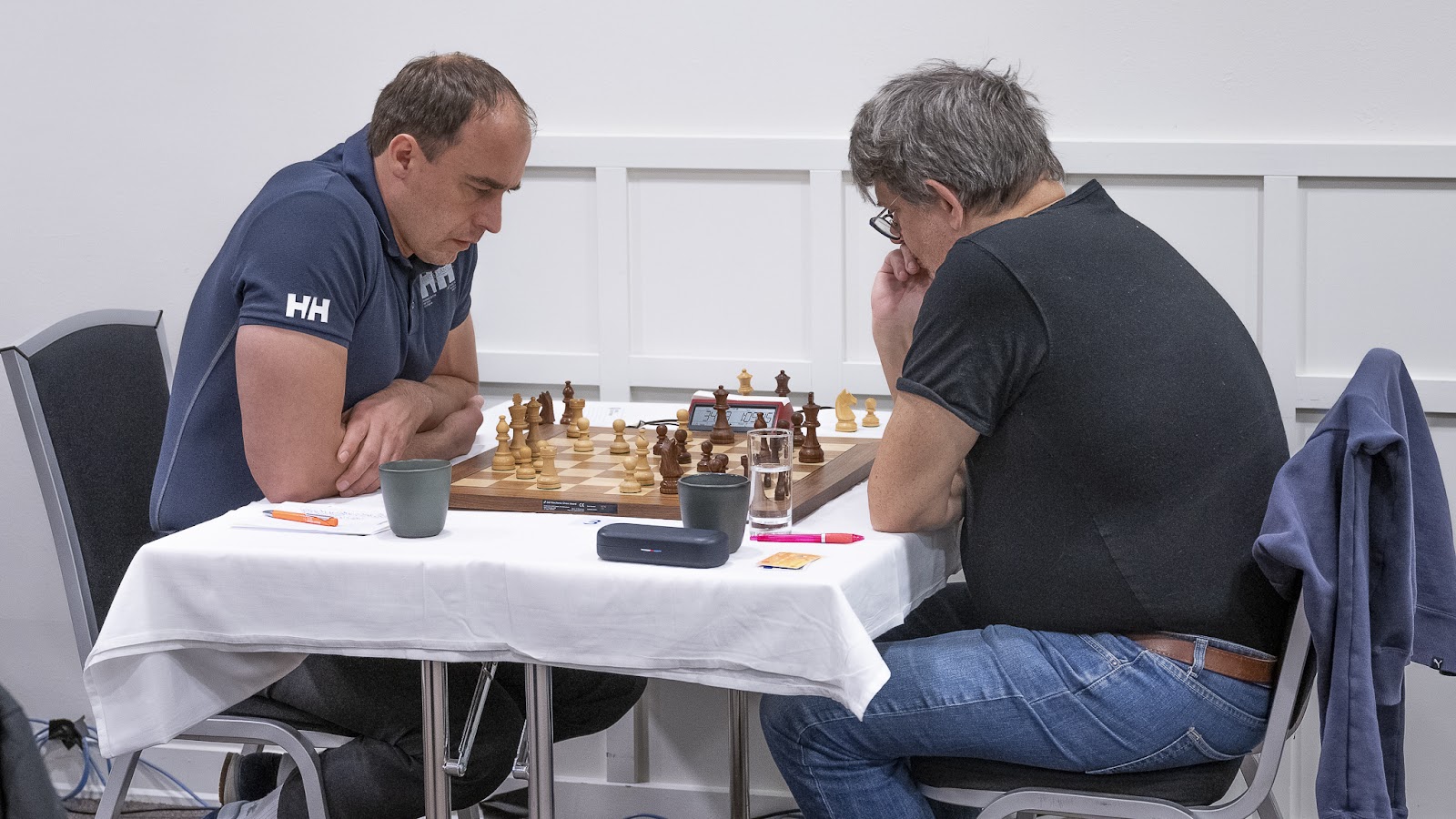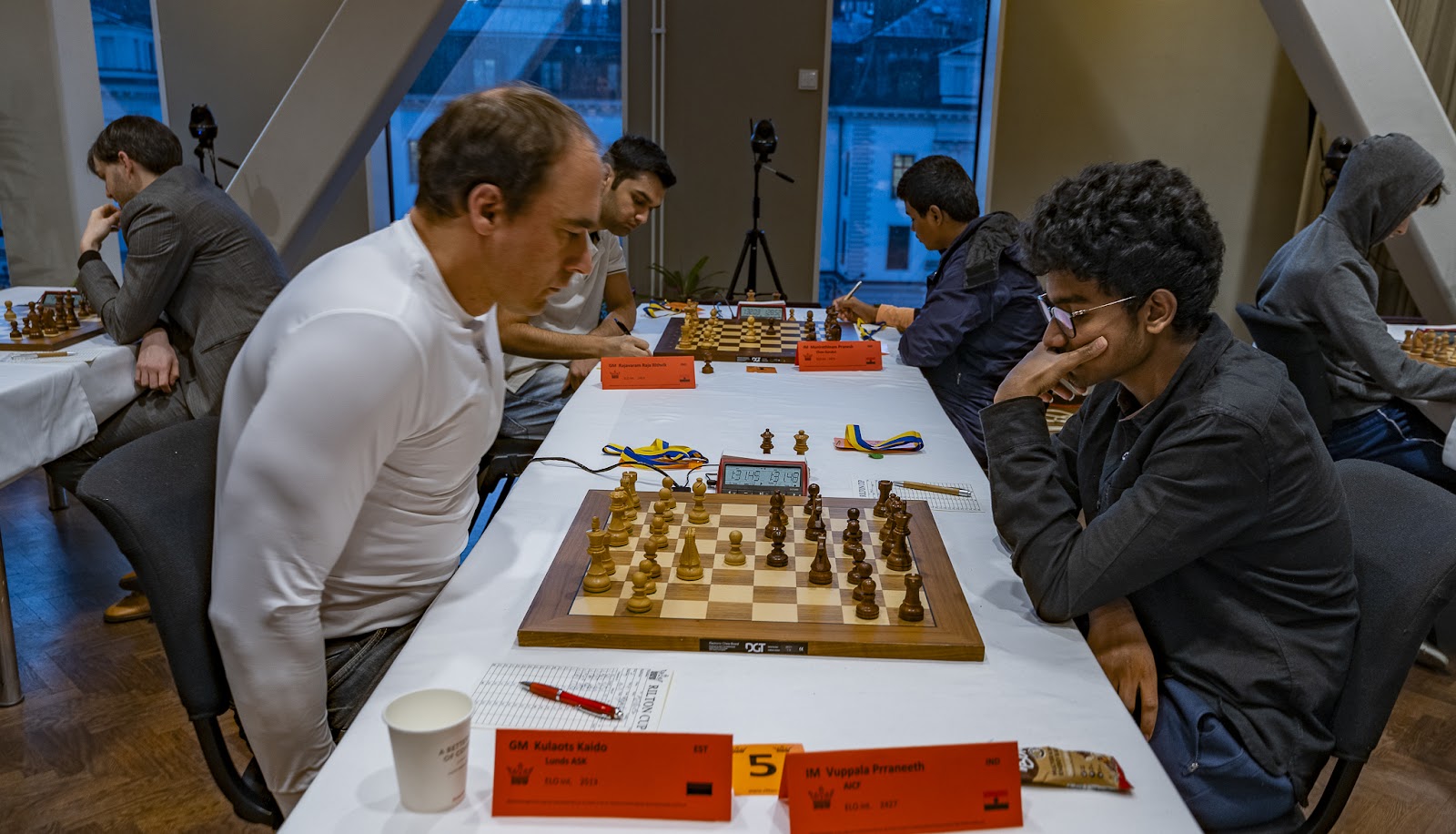The Remarkable Chess Journey of Kaido Külaots
Kaido Külaots was born 28 February 1976 in Pärnu, Estonia. He has won the Estonian Chess Championship ten times and was awarded the title Grandmaster by FIDE in 2001. Külaots is one of the few players to have a positive lifetime record against former World Champion Magnus Carlsen.

Photo: Lars OA Hedlund
You were born and raised in Estonia while it was still part of the Soviet Union. In the West, we talk about the so-called "Soviet Chess School". Was there such a thing or is it just a myth?
It is that in Soviet Union chess simply had much higher status than it did in the west. Or one could also say that the priorities were different. And chess did appear to be one of such priorities in that big empire if I may use the word. It the west chess did not have enough weight to connect it with terms like school, schooling, etc. But physically Soviet Chess School did not exist.
How much of a well-known figure in the public eye was Paul Keres when you grew up and how is the situation now?
I would say he was one of the main reasons facilitating my entering chess and staying in it for good. He was elected the sportsperson of 20th century in Estonia (the poll included all sports!) and he depicted on the 5-kroon banknote when we reestablished our national currency. These unique occurences already speak volumes about his popularity.
The time has not been standing still and nowadays I am not too sure that every (young) person on the street would be able to tell you who Paul Keres was, but well, I myself am still frequently going to the chess house in old town of Tallinn, which bears his name. It is a beautiful building.
How did your chess training in your childhood look like? Did you attend a Pioneer Palace or was there a chess club? Where did you get your information from in a time without the internet or chess databases and engines?
I indeed did manage to become a pioneer (those were more or less the final years), but attending Pioneer Palace, no, no. With me it was simple, without any big flourish. My dad taught me the game when I was around 6. He did not need to take any extra time for that. He was frequently moving the pieces around on the typical magnetic board analyzing his ongoing correspondence games. When I started going to school (probably next year) he took me to the chessclub in nearby Pärnu, where the chess classes happened 3 times a week.
My main source of information was dad´s cupboard. It contained quite a decent body of Soviet chess literature. Most of which was in Russian language, the remaining part in Estonian. It did occur that I was waiting for the school day to end, so I could go back home and grab a certain chess book.
Estonia is a small country so to improve, you probably had to start playing abroad early. Take us back in time, how did you find out and select tournaments back then?
Playing abroad meant playing in other Soviet republics :-) My first trip to the "west" was only when I was already 14 and it was Finland, which is 80 km away from Tallinn. Nowadays there are world and European championships starting from U8! I had to wait until I turned 16 (and Estonia regaining independence) when I was able to play my first world event (it was world U16) in Duisburg, Germany.
Before that you needed to qualify from the Soviet Union youth championships. Only the winner qualified. One could easily imagine that in these instances the qualification event was of much higher level than the terminal event itself.
For some period of time I was playing some international correspondence chess along with my father (we both had our own games to play). I think that did a few good things to analysing skills. Needless to say, all of the analysis needed to be done using your own head.
When did you realize that chess could be something for you to do professionally?
Probably after winning bronze medal in world U18 I got the feeling that there indeed could be something in me. I can add, though that further success did not hurry with its arrival.
Once you had turned pro, what did your life look like?
Well, quite soon after turning, so to say, a pro, I ended up serving in Estonian military, which was still in its infancy. So the daily routine for a newborn chess professional was pretty suitable - wakeup at 6.00, morning gymnastics, breakfast and so on.
But actually during the army service I was very actively playing in tournaments abroad. I was considered a promising sportsman and there were no big obstacles in getting out to the tournaments.
When you are a chess professional it really might seem enviable thing to a person from outside - you wake up whenever you want and do what and when you like. In reality though, you really need arrange your day in a disciplined way. I am not fully sure that I was strict enough in this sense.

Photo: Lars OA Hedlund
How would you describe yourself as a player?
It is not easy to be objective about yourself. I just know that many others for some reason consider me being a very aggressive in his games, maybe even a fearless player, haha.
We have players from Latvia and Lithuania at our tournament. How close are the chess relations between the three countries?
The relations between the Baltic states are friendly, be it chess or in general. With Latvia we have historically had matches on 100 boards, the last one dating back to 2018. A few years ago we were having Baltic zonal tournament, consisting of one leg in each country. Unfortunately as for the current moment both the grand matches and also the zonal (which yielded a spot to World Cup I managed to capitalize on in 2017) are on halt. I do hope they will be resurrected.
Is it true that Estonia has much closer ties to Finland than to Sweden?
Helsinki is just 2-hour ferry trip away and they run like every couple of hours :-) One thing is that we are rather close in terms of language, but speaking in economical terms, there are a lot of Estonians who have left to Finland in order to make a living over there.
Also chess wise, Finnish team championship attracts most of the Estonias best players. It is close and it is mostly convenient (unless the games are being held really up in the north)
This being said, there was time when Estonia was a part of Swedish Kingdom. Unfortunately that was too long ago for me to have recollections. Personal ties I have in regards to Sweden are all certainly pleasant
Chess is booming in Sweden since the pandemic and The Queen's Gambit. Have you noticed a rise in popularity in Estonia as well?
I have very frequently noticed random people playing chess on their smartphones in online chess platforms. Be it in public transportation, gym´s locker room or elsewhere. So considering that frequency chess can indeed be called popular over here.
Professional chess is of course completely different story, for the time being it is not ranked highly. Here we have got a bit to think about.
When did you first start playing tournaments in Sweden?
My first was 1993/94 Rilton Cup. From 2001 I started playing for my Elitserien club Södra SASS.
You also play in the Swedish league for Lunds ASK. How did you get involved with that club?
By that moment I did not have a team in Elitserien. Probably I was viewed as an interesting player/person and was contacted by the team. I agreed to become a member. We have also had some success during the years, having won the national title too.
For which teams in what countries are you playing for this season?
One thing is on how many lists I am and the other in how many leagues I actually play/am really invited to play. As for the current year, I have been playing for Finnish league and French Top 16. Just now in December I had my first 2 season games in 2nd Bundesliga (let´s see if we can go up).
When did you start playing in the Rilton Cup for the first time and how many times have you been here?
As noted earlier, the first was 1993/94. The next had to wait for exactly 10 years. Then one more in 2007/08. Since 2016 I have played basically all of them, excluding those pandemic years. There really needs to be a very good reason to skip it :-)
You have played a lot of open tournaments. What is unique about the Rilton Cup compared to the other tournaments?
For me it begins with the ferry trip from Tallinn to Stockholm, which I prefer to flying over there, if possible.
The venue and location are absolutely great (I recall they were actually also very nice in Münchenbryggeriet, when I started the journey). And I just do like Stockholm, many recollections as well.
And you get to meet the new year during the tournament! Even having a luxury of a day off in new years day. When I have played a tournament at the turn of the year, in majority of cases it as been Rilton Cup.
The Christmas with the family and then off to Rilton, this is how it normally has been for me.
You were here last year when we first introduced fair play measures together with FIDE's Fair Play Commission. What is your take on how strict anti-cheating measures should be at an open tournament?
It is an especially big problem in open tournaments where there can be a huge number of participants. Playing such tournaments would nowadays only make sense when doubts that your opponent (or anybody in your competition) is using any sort of assistance during play is kept at the very minimum. So accordingly the measures should be strict enough to ensure that.
In addition , I am definitely for really strict punishments when proven guilty. This "doping" of our sport is just too strong to show any tolerance toward it.

Photo: Lars OA Hedlund
The biggest upset victory in your career is probably the win at the Aeroflot Open. Can you tell us about this event?
There were some who called it the biggest upset they have ever witnessed, to quote one top American grandmaster.
In Aeroflot A tournament the rating threshold used to be 2550 in its later years. By the start of the tournament my rating was 2542, so striclty speaking I should not have been allowed into the A. However, I wrote to the organizers, told them about my rating and asked if there were options to choose from. They kindly replied that I would be free to choose myself whether I enter A or B tournament. Now, many would have considered choosing the main tournament a complete craziness, wouldn´t you have a decent chance to take home a hefty prize in B tournament where you would be one of the rating favourites? My choice was different, however. I guess this is a clear indication that I still had a lot of chess ambition inside of me.
Probably nearly every opponent was planning to beat me, but it turned out to be not that easy. I scored 5-4, five wins and 4 draws, for the rating performance of 2873. My lowest rated opponent in this open tournament was still a devil´s dozen points above 2600.
One curious thing was that on one day I found myself wondering was there anybody at all older that me amongst the participants there. After completing the quick scan of the playing hall I detected nobody, but one. So I don´t now, is age indeed just a number?
As a result, you were invited to play in the super tournament in Dortmund. How was that experience for you?
For most of the chessplayers chances of playing in a such high level closed tournament are close to none. And when it does happen, it nearly always happens much earlier in their careers. Although I had been in chess for some decades already, I still felt myself like a newbie in a way. How at all to prepare for such a tournament and all the questions. All the answers I had to find by myself.
The start did not appear to make things easier. Drawing of lots gave me a lucky five, meaning that I had to start my tournament with two blacks. Regrettably I did not survive those, but to my big credit, I did not collapse after that, refusing to lose a single game thereafter.
Do you also have chess students?
I do have some students. In addition to that I have been coaching national teams in Chess Olympiads. For instance in the last Olympiad in Chennai I was the coach of... both Estonian men´s and women´s team.
You are physically very well built. What is your fitness regimen during tournaments?
I indeed cannot be too unhappy about my physical condition. When I am at home visiting the gym 5 times a week is a norm. In addition to that I certainly do want to achieve my daily steps.
When in tournaments, the situation is more tricky. True, sometimes I do manage to find a gym. Be it how it may, some amount of physical activity I also try to accumulate during the tournaments.
To make it complete, it makes sense to observe proper nutrition too.